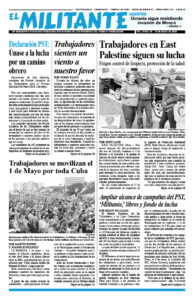Squeezed by inflation and worsening job conditions, hundreds of thousands of workers worldwide took to the streets May 1 determined to fight against the capitalist bosses’ attempts to push their growing economic crisis onto our backs.
Tens of thousands of workers marched in South Korea. “The price of everything has increased except for our wages. Increase our minimum wages!” one union speaker told a rally in Seoul. “Reduce our working hours!”
The actions followed widespread protests in March that forced the government to drop plans to increase the maximum workweek from 52 to 69 hours. Many young Koreans had joined those actions, pointing to the negative impact on families and the birth rate, one of the lowest in the world. The bill would have made it “legal to work from 9 a.m. to midnight for five days in a row,” said one union leader. “There is no regard for workers’ health or rest.”
South Korean President Yoon Suk Yeol has been going after the unions. “The government is calling the rummaging through accounting books, the levying of 1.5 million won [$1,135] fines … a ‘labor reform,’” Kim Dong-myung, chairperson of the Federation of Korean Trade Unions, told a rally in Seoul.
“Raids have become routine,” Yang Kyung-soo, chair of the Korean Confederation of Trade Unions, told the crowd. “Their aim is to dissolve democratic unions by labeling them illegal, corrupt, violent and accusing them of espionage.”
In France, close to 800,000 took to the streets. The actions marked the first time since 2009 that all eight of France’s main unions joined together for the annual May Day protest.
On April 15 French President Emmanuel Macron signed a law raising the retirement age from 62 to 64, after his prime minister wielded a special constitutional power to impose it without a vote in parliament, despite weeks of protests.
“The way the reforms were passed was revolting,” Nathi, a young student, told the press at a rally of over 100,000 in Paris.
The next day unions announced more nationwide protests for June 6. “Still united, numerous and determined to get the [pension law] withdrawal and social progress,” the unions’ joint statement said.
Hundreds of workers turned out in cities across Canada. Led by members of the Public Service Alliance of Canada — some 35,000 of whose members were still on strike — hundreds of workers and supporters marched May 1 in St. John’s, Newfoundland.
“The fight by the PSAC for better wages to keep up with inflation and better working conditions doesn’t just benefit their members today, but workers right across this country,” Jessica McCormick, president of the Newfoundland and Labrador Federation of Labour, told the crowd.
In Winnipeg hundreds of workers and union supporters, including members of the Manitoba-Cuba Solidarity Committee, marched to the Manitoba Legislature to demand 10 paid sick days for all workers and access to health care for all regardless of immigration status.
Organized under the theme of “Who benefits from inflation? Not us!” 500 people — including some of the 40 striking members of the Confederation of National Trade Unions at the Notre-Dame-des-Neiges Cemetery and a big contingent of unionized construction workers — marched and rallied in Montreal.

